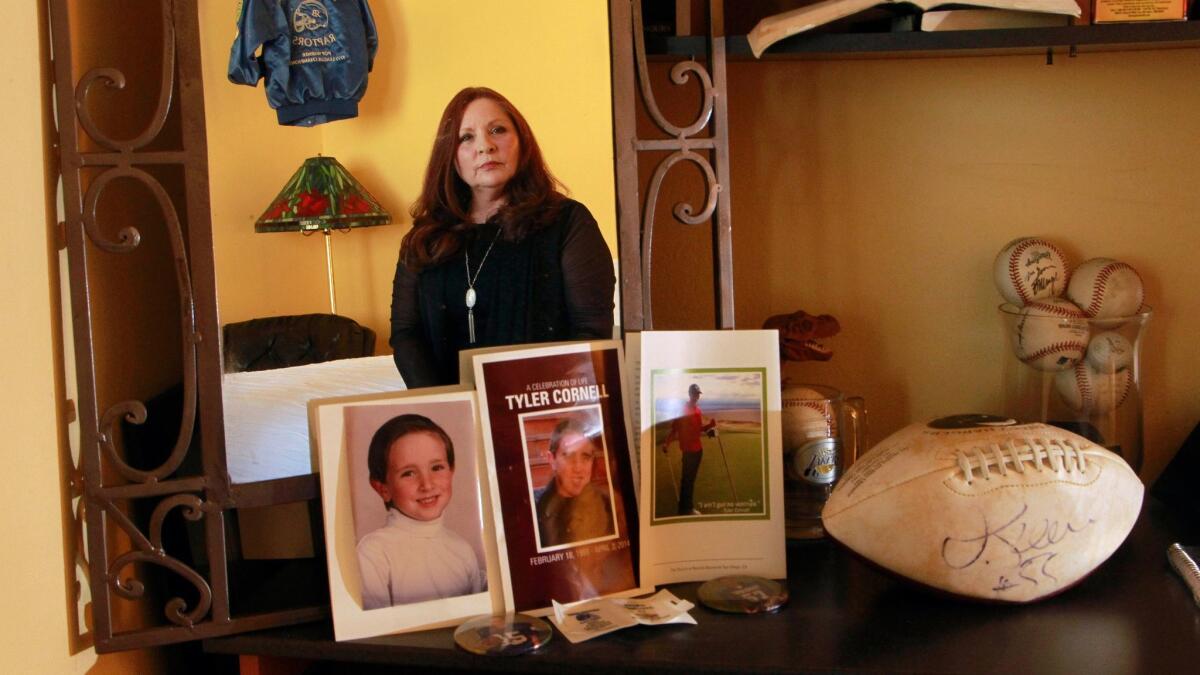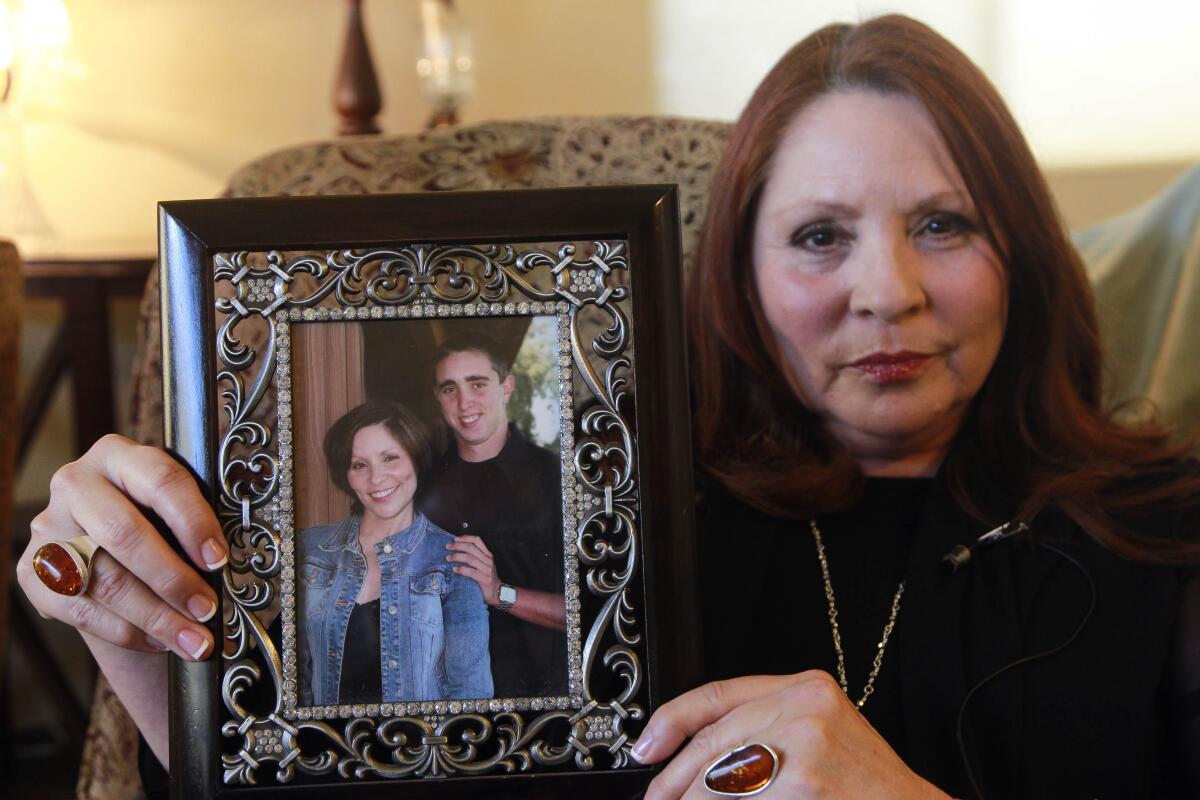Wrongful death suit against Pop Warner by Southern California moms rejected by judge

California Judge rules he can’t find cause-and-effect to send case of two deaths to trial; mothers Jo Cornell and Kimberly Archie vow to appeal
SAN DIEGO — Two weeks before it was set to go to an unprecedented trial, the case of two Southern California mothers who sued Pop Warner youth football over the deaths of their sons was rejected in U.S. District Court in Los Angeles.
Judge Philip S. Gutierrez granted a motion of summary judgment Friday to the defendants, Pop Warner Little Scholars, Inc., ruling against plaintiffs Kimberly Archie, of Los Angeles, and Jo Cornell, of San Diego, who sought monetary damages for seven causes of action, including negligence, fraud and wrongful death.
The case would have been the first in the U.S. against Pop Warner to reach trial stage. Other plaintiffs who have sued Pop Warner for their sons’ injuries or death have agreed to settlements for undisclosed amounts of money.
After hearing oral arguments from both sides in court Monday, Gutierrez concluded in his ruling there wasn’t enough evidence that Pop Warner’s alleged negligence led directly to the deaths of Paul Bright Jr. and Tyler Cornell.
The men died months apart in 2014 — Tyler Cornell, 25, from suicide and Paul Bright Jr., 24, in a motorcycle accident on a city street in Reseda. Each of their brains was examined and both were diagnosed with chronic traumatic encephalopathy (CTE), a degenerative brain condition that some in the medical community link to playing contact sports such as football.
Both played youth football, with Cornell participating in Rancho Bernardo Pop Warner and all four years at Rancho Bernardo High School. Bright played Pop Warner in Sparks, Nev., and as a freshman in high school.
Vowing to take the lawsuit to the 9th Circuit Court of Appeals — a process that could last several years — Archie said from Cornell’s home in Rancho Bernardo on Saturday, “You don’t declare a winner after the first quarter. This case isn’t dead.”
CTE has become a prominent subject in recent years following the 2015 movie “Concussion” that documented the death of Pittsburgh Steelers offensive lineman Mike Webster and the CTE research led by forensic pathologist Dr. Bennet Omalu.
There have been several prominent former NFL players diagnosed with CTE after their deaths, including Pro Football Hall of Famer Junior Seau, the former Chargers linebacker who committed suicide in his Oceanside home in 2012.

For the current case, the plaintiffs secured a medico-legal report and declaration from Omalu, who wrote that in “every game of football, a child suffers multiple blows to the head. … Each and every blow to the head contributes to eventual brain damage outcomes as a result of cumulative risk exposure.”
Gutierrez, however, said in his ruling that he did not see a clear cause-and-effect between the playing of football by Bright and Cornell and the reasons for their deaths. He wrote, “The Court cannot conclude that Plaintiffs have presented evidence to create a triable issue as to actual causal causation which is not speculative.”
He added that he saw no evidence of Bright and Cornell having suffered concussions or head injuries, or how frequently they suffered head impacts in Pop Warner. Gutierrez said a jury would have to “assume the generalized notion that the playing of Pop Warner football resulted in sufficient head impacts to cause CTE.”
“We appreciate the court’s attention to the case and the care the judge put into his decision,” Tony Coletto, the lead attorney for Pop Warner, said Saturday in a telephone interview. “We think, given a very clear set of facts … although it’s tragic that one man died in a motorcycle accident and another young man took his life, there is nothing in either circumstance that can be blamed on playing Pop Warner football.”
In a statement emailed to the Union-Tribune, Pop Warner Executive Director Jon Butler said, “While we have long held that it is not reasonable to suggest Pop Warner was responsible for the deaths of these two young men in their 20s, we empathize with the parents. We cannot imagine the pain they felt losing their sons to suicide and a motorcycle accident. It is tragic.
“We are grateful that the judge in this case gave great consideration to the arguments and agreed with our position.”
Bob Finnerty, the Los Angeles-based attorney representing Archie and Cornell, said Saturday he was “disappointed that the court didn’t put much effort into it. Since our overall goal is to protect the kids, I feel confident that we will be successful in the long run.”
Finnerty argued an actual diagnosis of concussion or head injury should not be the standard by which the current case is judged.
“The disappointment is the fact that the judge could not seem to understand or comprehend the simple, repetitive nature of collision sports resulting in permanent or chronic injuries,” Finnerty said. “It seems like it’s acceptable in every other sport that you can wear out a joint or overstretch ligaments, but for some reason a collision sport involving 12-year-olds is somehow different.”
Archie and Cornell have been ensconced in Cornell’s home for months preparing for the case. Archie is a longtime youth sports safety advocate who has testified in numerous sports injury cases. Cornell is a retired paralegal. They filed a 2,000-page response to the court in their case.
The loss was a blow considering the stakes, but they contend they are undeterred.
“What I have told friends is that what we’re doing is shedding the light in the dark place,” Cornell said. “Football, from top to bottom, is a dirty little secret. We stand proud in the work that is being done, and this is going to be justice delayed, not denied.”
Archie said she believed the judge erred in making a decision about specific causation of their son’s deaths.
“It’s not the court’s job to decide specific causation,” Archie said. “That’s for the jury to decide.”
Archie said, “My son would be proud. Tyler would be proud of us. We’ve done the right thing, and we’ll continue to push forward. We’ll do whatever it takes. We’re not the last families; we’re the first.”
Advocates for youth football saw the ruling as a victory. Steve Famiano, a co-founder of the California Youth Football Alliance who lives in Apple Valley and has served in youth football for 18 years, said of the court decision, “This is big.”
Speaking by phone Saturday as a representative for CAYFA, Famiano said, “We believe it’s ultimately up to the parents to decide what their child should be able to do. …You inform the parents, give them the information, and if they ultimately decide not to play youth football, that’s fine. But it shouldn’t be legislation or lawsuits that dictate what a child is able to do.”
Famiano was among a group that formed the organization Save Youth Football, which opposed a proposed California bill in 2018 that would have banned tackle football for kids under 12 years old. Amid pressure from football advocacy groups, the bill was pulled at the committee level before reaching a vote.
Famiano and others subsequently formed CAYFA and worked on a bill called the “California Youth Football Act” that was passed by the legislature and approved by Gov. Gavin Newsom in July 2019.
Set to go into effect in January 2021, the act, in part, further limits full contact in practices; requires that coaches receive training in head injury protocol and tackling techniques; that parents are given concussion and head injury education; and that at least one state-trained medical technician be in attendance at all games.
Famiano acknowledged that youth football has suffered participation losses in recent years because of more discussion and media attention about the possible effects of head trauma in the sport.
“It’s funny. We get attacked by a lot of people who say you’re just defending football,” Famiano said. “We’re not defending football. We don’t think that there isn’t anything that can’t be changed in football. We know there can be changes and that we as adults can do a better job for our kids and make them as safe as possible. We just don’t believe in banning youth sports.”
More to Read
Go beyond the scoreboard
Get the latest on L.A.'s teams in the daily Sports Report newsletter.
You may occasionally receive promotional content from the Los Angeles Times.











